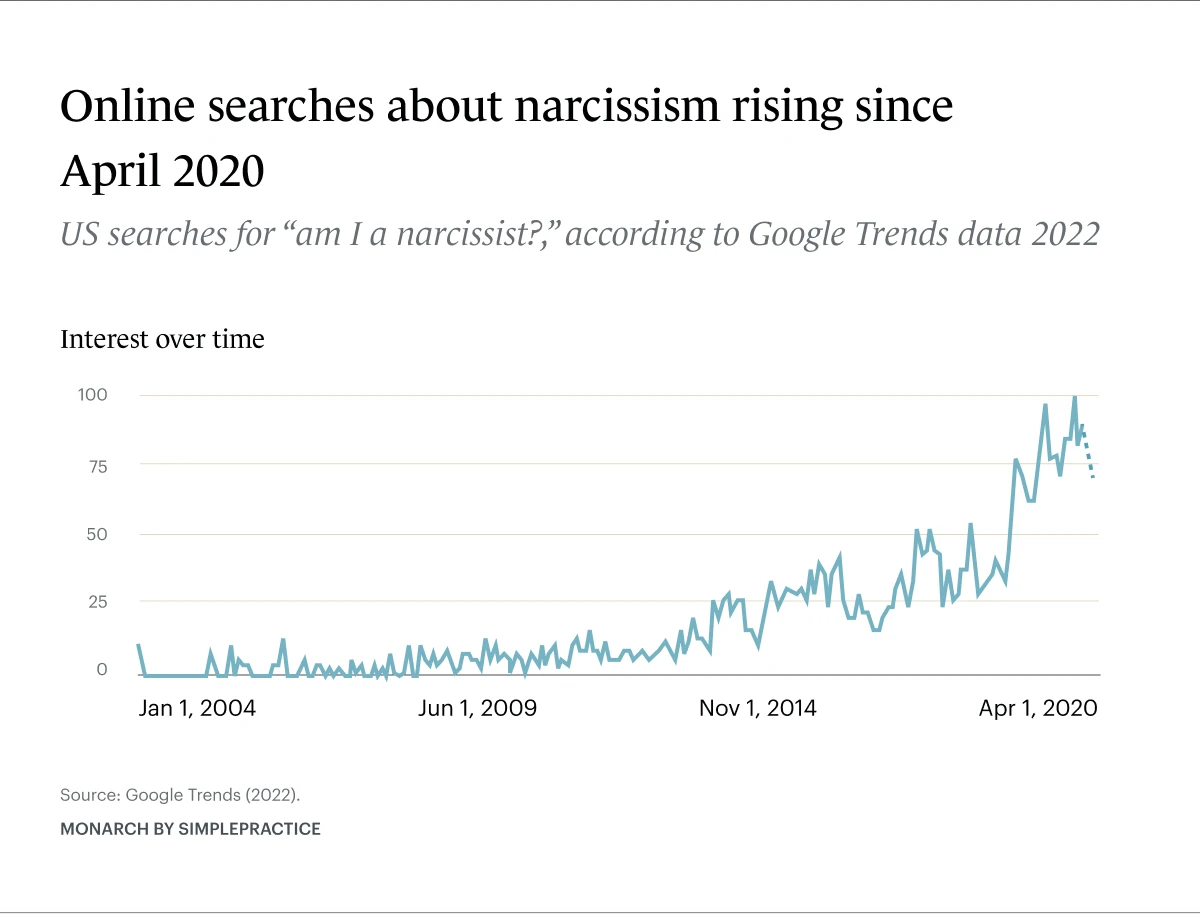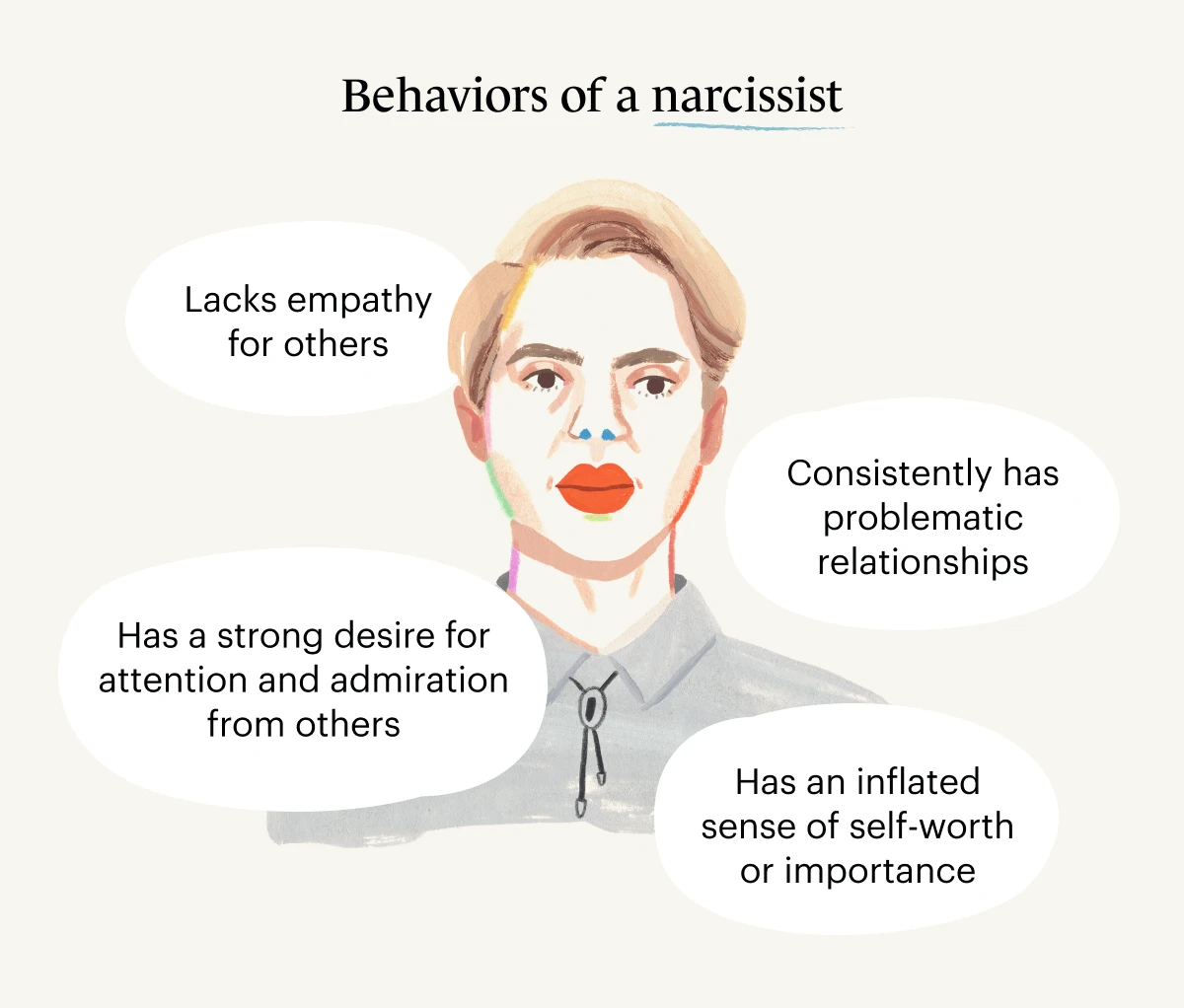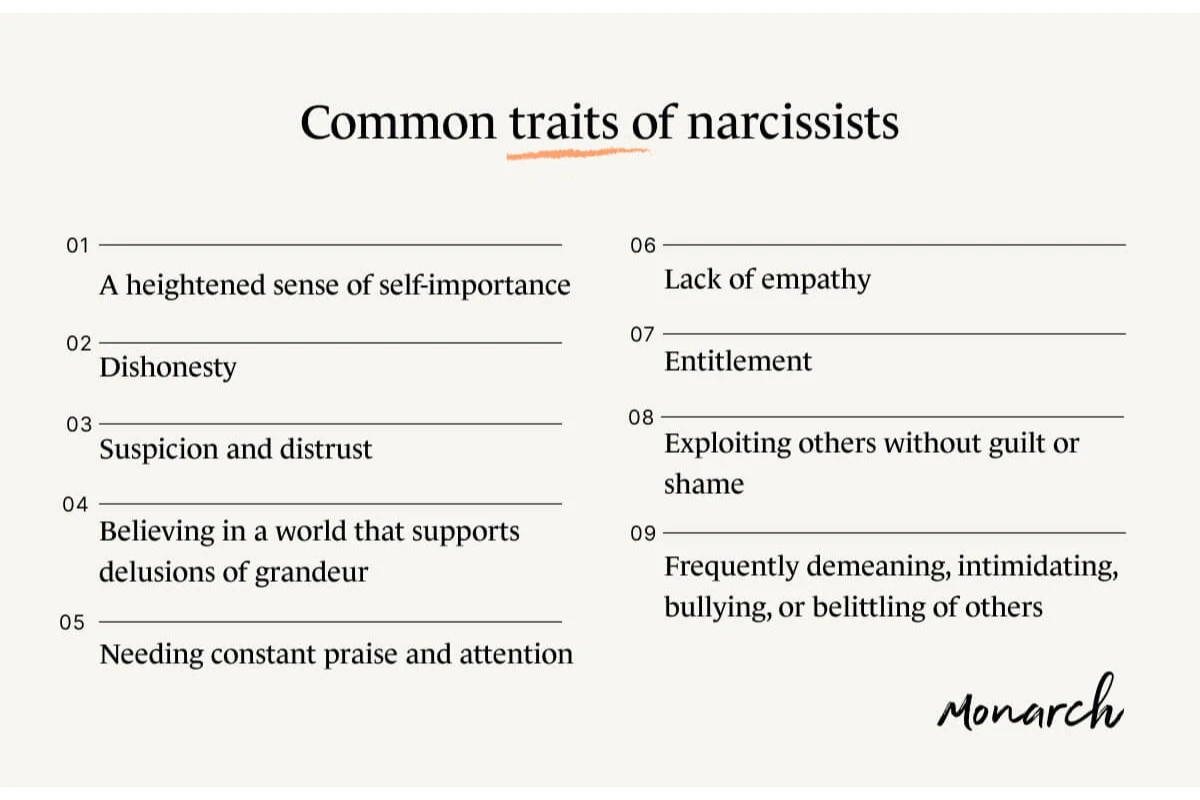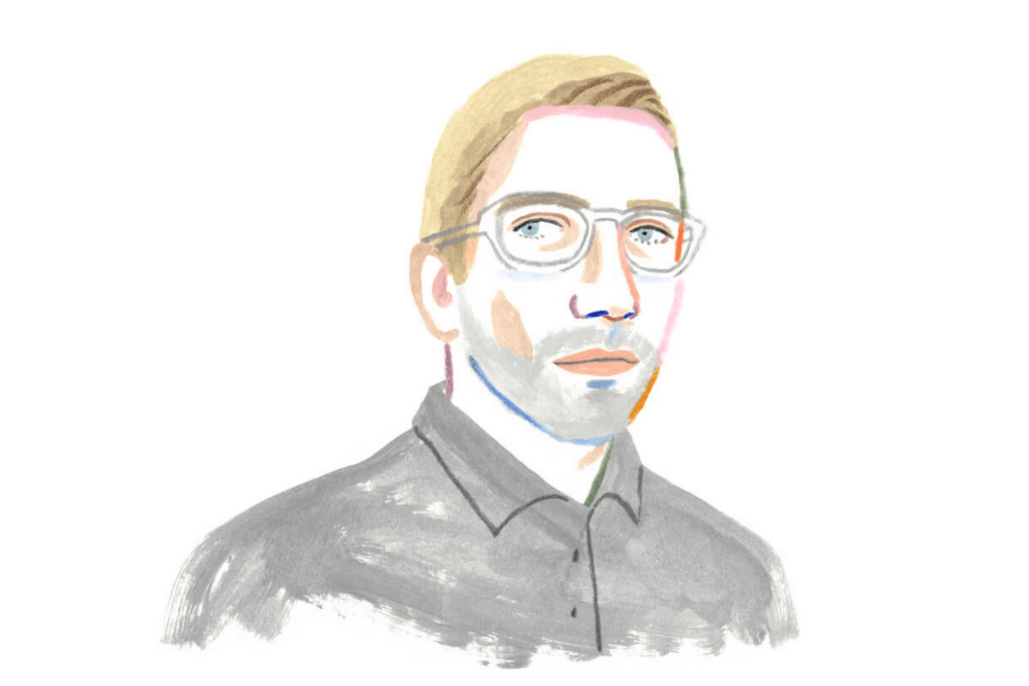How do I know if someone's a narcissist?
What are the traits of a narcissist?
How can you tell if someone is narcissistic?
Am I a narcissist?
As we get more comfortable talking about emotional health and therapy, we’ve started to discuss personality disorders more openly on social media and in conversations with friends and family.
How can you tell if someone is narcissistic?
Americans' interest in narcissism and narcissists have been on the rise, particularly searches for narcissistic personality disorder (NPD) and the question "Am I a narcissist?"
(We can actually help you find out the answer if you take our 3-minute online test to assess your narcissistic personality traits.)
You'd almost think we're all completely surrounded by narcissists.
But, you'd be wrong to presume that.
Read on to find out what it means to be a narcissist, how to know if you’re dealing with one, and what to do about it.

How many people are narcissists?
It may be surprising to learn that the condition of narcissistic personality disorder (NPD) affects only about one percent of the population.
There are approximately 3.3 million narcissists living in America today.
And, while it may sometimes seem like there are more narcissists in the world than ever before, the percentage has remained consistent since the term was established in 1968.
This means there are approximately 3.3 million narcissists living in America today.
Maybe you're wondering if you know one?
Behaviors of a narcissist
If someone's narcissistic, they:
Lack empathy for others
Have an inflated sense of self-worth or importance,
Have a strong desire for attention and admiration from others
Consistently have problematic relationships
Always put themselves first, and, consequently, have trouble keeping jobs and friendships.
Maybe you're wondering if you know one?
What's narcissistic personality disorder (NPD)?
According to the Diagnostic and Statistical Manual of Mental Disorders, fifth edition (DSM–5), narcissistic personality disorder (NPD) is characterized by a pattern of grandiosity—the excessive need for admiration from others and lack of empathy.
This can present as a palpable sense of entitlement.
Narcissistic personality disorder (NPD) is characterized by a pattern of grandiosity—the excessive need for admiration from others and lack of empathy.
This behavior usually begins in early adulthood, when someone's in their early twenties.
People with NPD feel entitled to—and may demand—special treatment not offered to others.
This arrogant and demanding behavior is evident in every area of the narcissist’s life and, because they always put themselves first, they have trouble keeping jobs and friends.

How can you tell if someone is narcissistic?
Nearly all of us have probably thought at some point: “Yep, I’ve worked with a narcissist,” or “Oh yeah, that’s my sister, brother, mother, aunt, uncle…”
But how can we know for sure? Check this list.
These are the 9 telltale traits of a narcissist
Wondering whether you might be dealing with someone who's narcissistic. Here are the signs of narcissism to watch out for.
1. A heightened sense of self-importance
This one is considered the “defining characteristic of narcissism.” And it’s much more than simply arrogance or vanity.
Narcissists believe they are unique or special in every way—including what they do, how they dress, and what they look like.
This inflated sense of self is essentially a completely fabricated feeling of superiority.
Narcissists believe they are unique or special in every way—including what they do, how they dress, and what they look like.
They also think that their particular brand of “specialness” should only be surrounded by those who are on the same “level” as them.
The best of the best. Not only do they believe they deserve the best—they believe they are the best.
2. Narcissists are dishonest
Dishonesty is essentially the foundation of narcissism.
The narcissist has no problem exaggerating or outright lying to enhance their accomplishments or their own stature.
And when a narcissist tells you a story that seems a bit over-the-top, somehow you become the jerk if you point out the inconsistencies in their tale.
3. Suspicion and distrust
On the flip side of their tendency to lie is the assumption that others are being dishonest.
In other words, narcissists tend to deflect onto others.
The narcissist has no problem exaggerating or outright lying to enhance their accomplishments or their own stature.
But like everything else about a narcissist, this trait is rooted in self-absorption. According to the DSM-5: “These qualities derive primarily from fears of having imperfections or flaws [about themselves] revealed.”

4. Narcissists believe in a world that supports their delusions of grandeur
Narcissists live in a self-created fantasy world supported by distortion and self-deception.
Not entirely in touch with reality, people with NPD often create these delusions of unlimited success, power, and love that makes them feel more important and in control.
Distortions of facts are either denied or changed so they fit the narcissist's narrative.
In reality, these actions hide their inner feelings of shame and emptiness.
Distortions of facts are either denied or changed so they fit the narcissist's narrative.
Anything that potentially threatens the breakdown of that facade will be met with rage and defensiveness.
The narcissist wants to protect that fantasy world at all costs.
5. Needing constant praise and attention is a trait of a narcissist
The DSM notes that the narcissist’s demand for positive attention is continual.
It goes beyond the desire for the occasional compliment.
Narcissists “crave attention from others, and they usually want praise for their ‘superiority.’”
6. Narcissists lack empathy
Narcissists are often accused of being emotionless, but that’s not by design.
Since a narcissist's number one concern is themself, offering a hug or a shoulder to cry on to someone else in need is not something that occurs naturally to them.
7. Entitlement is closely linked with narcissism
Because of this inflated sense of self, narcissists believe they deserve and are owed special treatment.
8. Exploiting others without guilt or shame
To a narcissist, dealings with people are totally transactional.
As a consequence, not only might they exploit other people in service of their own ends—they do so without any qualms.
It’s not that people with NPD are actively unkind, it's more that they're unaware of the pain they may cause when taking advantage of others.
9. Frequently demeaning, intimidating, bullying, or belittling of others
A narcissist will feel threatened when they encounter someone with something they themself lack, whether it's something tangible—like a car or house—or something less material, such as beauty, fitness, or the ability to charm others.
Narcissists will often resort to bullying, intimidation, and other demeaning tactics in order to put the other person down or get them to “fall back in line.”

Am I a narcissist?
After reading all this, you may even be wondering if you, or someone you know, has narcissistic personality disorder.
Take our 3-minute test to assess narcissistic personality traits and determine if you exhibit the symptoms of narcissistic personality disorder. Results are completely confidential.
READ NEXT: How to React to Narcissistic Triangulation?
Consider talking with a mental health professional. The Monarch Directory by SimplePractice can help you find a therapist near you with online booking and availability.
American Psychiatric Association. (2013). Diagnostic and statistical manual of mental disorders (5th ed.). Arlington, VA: Author.
Mayo Clinic.(2017). Narcissistic personality disorder - Symptoms and causes. Retrieved from https://www.mayoclinic.org/diseases-conditions/narcissistic-personality-disorder/symptoms-causes/syc-20366662








